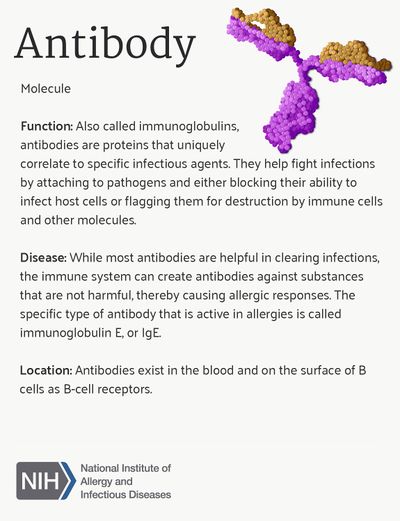Immunoglobulins (Ig)
This article or area is currently under construction and may only be partially complete. Please come back soon to see the finished work! (3/12/2020)
Original Editor - Lucinda hampton
Top Contributors - Kirsten Coutts, Lucinda hampton, Kim Jackson and Nupur Smit Shah
Introduction[edit | edit source]
Immunoglobulins (Ig) or Antibodies
- Glycoproteins that your immune cells make to fight off bacteria, viruses, fungi, parasites, cellular antigens, chemicals, and synthetic substances.
- Are produced by plasma cells.
- B cells are instructed by specific immunogens, for, example, bacterial proteins, to differentiate into plasma cells, which are protein-making cells that participate in humoral immune responses.
- Immunoglobulins constitute about 20% of the protein in plasma[1]
- They act as a critical part of the immune response by specifically recognizing and binding to particular antigens, such as bacteria or viruses, and aiding in their destruction.
- The antibody immune response is highly complex and exceedingly specific. The various immunoglobulin classes and subclasses (isotypes) differ in their biological features, structure, target specificity and distribution.
- The assessment of the immunoglobulin isotype can be matched to a specific pathogen thus can be used to diagnose some diseases based on their unique structure. Antibody tests are used to detect disease-specific antibodies in a blood sample.[2].
- All antibodies are immunoglobulins but all immunoglobulins are not antibodies
- WHO officially coined termed the term Immunoglobulins for antibodies in 1964. [3]
Sub Heading 2[edit | edit source]
Sub Heading 3[edit | edit source]
Resources[edit | edit source]
- bulleted list
- x
or
- numbered list
- x
References[edit | edit source]
- ↑ Vaillant AA, Ramphul K. Immunoglobulin. InStatPearls [Internet] 2019 Nov 10. StatPearls Publishing.Available from:https://www.ncbi.nlm.nih.gov/books/NBK513460/ (last accessed 3.12.2020)
- ↑ Thermofischer scientific Immunoglobulins Available from:https://www.thermofisher.com/au/en/home/life-science/antibodies/antibodies-learning-center/antibodies-resource-library/antibody-methods/introduction-immunoglobulins.html (last accessed 3.12.2020)
- ↑ Easybiology antibodies Available from: https://www.easybiologyclass.com/difference-between-antibody-and-immunoglobulin/ (last accessed 3.12.2020)







